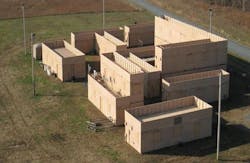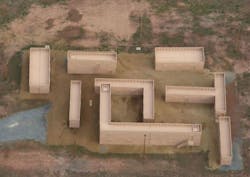Marines test fully autonomous aerial cargo hardware and software suite on military helicopter
MANASSAS, Va. Engineers at the Office of Naval Research (ONR) are planning a final demonstration of Aurora’s Autonomous Aerial Cargo Utility System (AACUS), which enables any rotary-wing aircraft to fly entirely autonomously, next week at Marine Corps Base Quantico’s Urban Training Center in Quantico, Virginia, as the program moves to the Marine Corps for experimentation and potential acquisition.
The demonstration, scheduled for 13 Dec. 2017, will feature a UH-1 “Huey” helicopter flying autonomously on multiple missions. It is expected to include at least three mission-focused autonomous flights and landings.
AACUS is a hardware and software suite that gives autonomous flight capability to full-size rotary-wing aircraft. It enables a Marine in the field to easily request supplies even to austere or dangerous environments, officials say. Those requests can be made intuitively and quickly from a handheld tablet, without prior training required.
“AACUS gives revolutionary capability to our fleet and force,” says Dennis Baker, AACUS program officer. “It can be used as a pilot aid in degraded visual environments, or allow fully autonomous flights in contested environments, keeping our pilots out of harm’s way.”
Aurora Flight Sciences, A Boeing Company is a technology company which strives to create smarter aircraft through the development of versatile and intuitive autonomous systems. Operating at the intersection of technology and robotic aviation, Aurora leverages the power of autonomy to make manned and unmanned flight safer and more efficient. Headquartered in Manassas, Virginia, Aurora has more than 550 employees and operates in six locations, including research and development centers in Cambridge, Massachusetts, and Luzern, Switzerland; manufacturing facilities in Bridgeport, West Virginia, and Columbus, Mississippi; and offices in Dayton, Ohio, and Mountain View, California.
The Department of the Navy’s Office of Naval Research provides the science and technology necessary to maintain the Navy and Marine Corps’ technological advantage. Through its affiliates, ONR is a leader in science and technology with engagement in 50 states, 55 countries, 634 institutions of higher learning and nonprofit institutions, and more than 960 industry partners. ONR, through its commands, including headquarters, ONR Global and the Naval Research Laboratory in Washington, D.C., employs more than 3,800 people, comprising uniformed, civilian and contract personnel.

Courtney E. Howard | Chief Editor, Intelligent Aerospace
Courtney enjoys writing about all things high-tech in PennWell’s burgeoning Aerospace and Defense Group, which encompasses Intelligent Aerospace and Military & Aerospace Electronics. She’s also a self-proclaimed social-media maven, mil-aero nerd, and avid avionics and space geek. Connect with Courtney at [email protected], @coho on Twitter, on LinkedIn, and on Google+.



